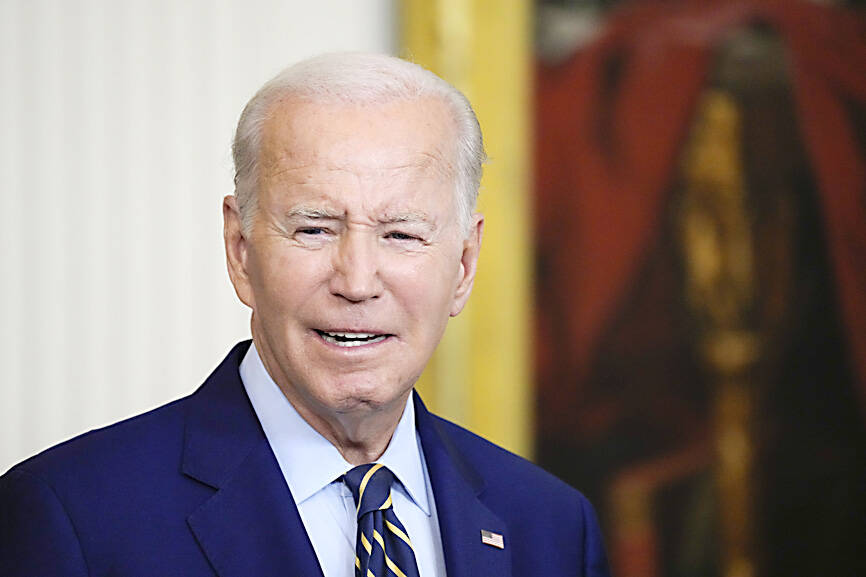US President Joe Biden on Monday signed into law a bill that approves the first agreement negotiated under a bilateral trade initiative between Taiwan and the US, the White House said in a statement.
The United States-Taiwan Initiative on 21st-Century Trade First Agreement Implementation Act took effect immediately after Biden signed it, the statement said.
After a year of negotiations, Representative to the US Hsiao Bi-khim (蕭美琴) and American Institute in Taiwan Managing Director Ingrid Larson on June 1 signed an initial agreement under the US-Taiwan Initiative on 21st-Century Trade in Washington.

Photo: AP
The first agreement, which does not cover tariff reductions or exemptions, covers general principles related to customs and border procedures, regulatory practices and anti-corruption practices.
It is hoped that the principles will facilitate bilateral trade and investment flows in part by minimizing border formalities, setting standards for the regulation of domestic services, and supporting small and medium-sized enterprises.
On June 9, US Senate Senate Committee on Finance Chairman Ron Wyden and US House of Representatives Committee on Ways and Means Chairman Jason Smith proposed the bill backing the first agreement under the trade initiative.
The legislation requires the US president to report to the US Congress on how the first agreement with Taiwan would enhance Taiwan-US trade relations and advance the interests of US workers, consumers, enterprises and farmers.
The president must also certify in writing to Congress within 30 days of the agreement entering into force that Taiwan has taken the necessary measures to comply with the terms of the agreement.
The bill requires US officials to ensure that any additional agreements with Taiwan be made transparently and in full consultation with Congress.
In the White House statement, Biden voiced concern over a portion of the law.
In cases where the requirements of Section 7 of the act, which require the transmission of trade deal drafts to Congress, would “impermissibly infringe upon my constitutional authority to negotiate with a foreign partner, my administration will treat them as nonbinding,” he said.
The bill, which the Senate passed on July 18, cleared the House on June 21 and was then sent to the president on July 27 to be signed into law within 10 days after being signed by House Speaker Kevin McCarthy.

The High Prosecutors’ Office yesterday withdrew an appeal against the acquittal of a former bank manager 22 years after his death, marking Taiwan’s first instance of prosecutors rendering posthumous justice to a wrongfully convicted defendant. Chu Ching-en (諸慶恩) — formerly a manager at the Taipei branch of BNP Paribas — was in 1999 accused by Weng Mao-chung (翁茂鍾), then-president of Chia Her Industrial Co, of forging a request for a fixed deposit of US$10 million by I-Hwa Industrial Co, a subsidiary of Chia Her, which was used as collateral. Chu was ruled not guilty in the first trial, but was found guilty

DEADLOCK: As the commission is unable to forum a quorum to review license renewal applications, the channel operators are not at fault and can air past their license date The National Communications Commission (NCC) yesterday said that the Public Television Service (PTS) and 36 other television and radio broadcasters could continue airing, despite the commission’s inability to meet a quorum to review their license renewal applications. The licenses of PTS and the other channels are set to expire between this month and June. The National Communications Commission Organization Act (國家通訊傳播委員會組織法) stipulates that the commission must meet the mandated quorum of four to hold a valid meeting. The seven-member commission currently has only three commissioners. “We have informed the channel operators of the progress we have made in reviewing their license renewal applications, and

Taiwan People’s Party (TPP) Chairman Huang Kuo-chang (黃國昌) yesterday appealed to the authorities to release former Taipei mayor Ko Wen-je (柯文哲) from pretrial detention amid conflicting reports about his health. The TPP at a news conference on Thursday said that Ko should be released to a hospital for treatment, adding that he has blood in his urine and had spells of pain and nausea followed by vomiting over the past three months. Hsieh Yen-yau (謝炎堯), a retired professor of internal medicine and Ko’s former teacher, said that Ko’s symptoms aligned with gallstones, kidney inflammation and potentially dangerous heart conditions. Ko, charged with

Taiwan-based publisher Li Yanhe (李延賀) has been sentenced to three years in prison, fined 50,000 yuan (US$6,890) in personal assets and deprived political rights for one year for “inciting secession” in China, China's Taiwan Affairs Office spokesman Chen Binhua (陳斌華) said today. The Shanghai First Intermediate People’s Court announced the verdict on Feb. 17, Chen said. The trial was conducted lawfully, and in an open and fair manner, he said, adding that the verdict has since come into legal effect. The defendant reportedly admitted guilt and would appeal within the statutory appeal period, he said, adding that the defendant and his family have